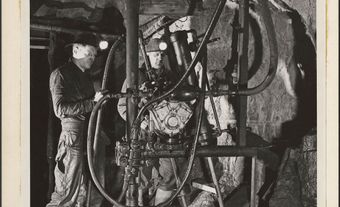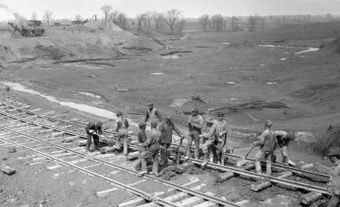This article was originally published in Maclean’s magazine on November 2, 1998. Partner content is not updated.
Necessary downsizing or corporate greed? Canadian National Railway Co.s announcement last week of plans to slash 3,000 jobs quickly prompted those diametrically opposed views. CN executives said the cuts were required to make the company more competitive.CN Cuts 3,000 More Jobs
Necessary downsizing or corporate greed? Canadian National Railway Co.'s announcement last week of plans to slash 3,000 jobs quickly prompted those diametrically opposed views. CN executives said the cuts were required to make the company more competitive. "We are trying to become the most efficient railroad in North America," said Paul Tellier, CN's CEO. That's not the way Buzz Hargrove, head of the Canadian Auto Workers, saw things. "It's greed, just greed," said Hargrove, whose union represents 6,500 CN workers. "The only thing that matters nowadays is shareholder value." For CN employees like Ray Mullett, the impact was more tangible. With 15 years' seniority, Mullett has been laid off twice in the past two years from his Montreal job unloading automobiles from railcars. "I can't plan ahead," complained Mullett, 34, standing outside the company's sprawling rail yards. "I can't go buy a house. I might not have a job tomorrow."
For employees, the announcement was particularly galling given the company's record profit of $807 million last year. Only last April, Michael Sabia, the company's chief financial officer, was promising a new era of growth. "The most dramatic cost-cutting is behind us," Sabia said. But that was then. Tellier said the latest round of staff reductions, which will be completed by the end of 1999, were necessary to keep pace with technological improvements, such as longer, faster trains, which require fewer employees. CN's third-quarter results announced last week accelerated the layoffs, Tellier said. Those results show a nine-per-cent dip in revenue due in part to Asian economic problems and declines in grain shipments. "It's a painful but essential decision," said Tellier.
As employees fretted, the company received an endorsement from other quarters. CN's stock shot up $3.20 after Tuesday's announcement, closing Friday at $75.20. But the stock market reaction was just salt in the wounds for CN workers, says Abe Rosner, national representative for the autoworkers union. "It's a feeling of being laughed at when they see the investment community is applauding," he said. "This has nothing to do with running a better railway." The job losses brought a weary sense of déj^ vu for CN staffers. A Crown corporation until 1995, CN has undergone a radical transformation in recent years. In its drive for efficiency, CN - with its latest cuts - has sliced its workforce almost in half since 1992, from 33,341 to 18,000. Along the way its stock has become a top performer, shooting up from $27 at its initial public offering in 1995 to a high of $96 earlier this year.
The latest efficiency drive has been in the works for a year, some analysts said, and gained momentum with the appointment last March of Hunter Harrison as CN's chief operating officer. Harrison had gained plenty of cost-cutting expertise as the former CEO of Illinois Central Corp., the most efficient U.S. railroad. CN plans to merge with Illinois Central and if the deal wins U.S. regulatory approval, the new company would become the fifth-largest railway in North America with the only north-south network stretching from Canada to the Gulf of Mexico.
Union officials question how the company can afford to slash more staff. "My honest feeling is there is no fat left in the system," says Gary Housch, vice-president of the Brotherhood of Maintenance of Way Employees, whose 6,000 CN members build and maintain tracks. "Now, they are starting to trim away meat." CN officials disagree with union contentions that the cuts may compromise safety. And they do not rule out more layoffs in the future. "CN is a work in progress," said company spokesman Mark Hallman.
Under Tellier's stewardship, efficiency has become a mantra. Analysts hail CN's success at driving down its operating ratio, a key industry performance indicator based on what percentage of revenue is required to operate and maintain the system. In 1995, CN's ratio hovered at 89 per cent while last year's healthier level of 78.6 was still higher than those of top U.S. railroads. From Wall Street to Bay Street, investment analysts give Tellier much of the credit for the company's success. "Paul Tellier is among the best in the industry," says James Valentine, an analyst with Morgan Stanley Dean Witter in New York City.
Many analysts also support CN's latest attempt to cut costs still further and don't foresee any problems down the line. "They have an extremely good track record of taking costs out, improving productivity and efficiency while maintaining the key criteria of serving your customer," says Mark Mettrick, a Toronto-based analyst with Standard and Poor's Corp., a New York bond-rating service. Adds Valentine: "Assuming this cost-cutting program is successful, I think they'll be positioned as one of the best North American railroads." But for CN's employees, reaching that goal will be a long and painful haul.
Maclean's November 2, 1998

 Share on Facebook
Share on Facebook Share on X
Share on X Share by Email
Share by Email Share on Google Classroom
Share on Google Classroom


